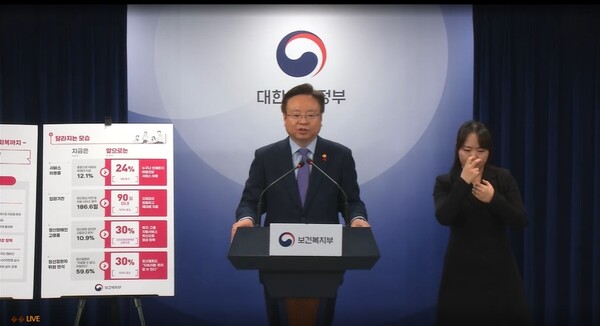
In response to the government's “Mental Health Policy Innovation Plan,” the National Assembly has urged it to proceed after analyzing the sustainability of policy implementation.
Regarding the proposed introduction of the “judicial hospitalization system,” which draws keen public attention, the Assembly particularly stressed the need to examine whether it can harmonize with the overall judicial system first.
The National Assembly Research Office made these and other points in its report, “Complementary Tasks for Implementing the Mental Health Policy Innovation Plan,” on Thursday. On Dec. 5, the government held the “Mental Health Policy Vision Declaration Convention” chaired by President Yoon Suk Yeol and announced the plan'.
The innovative plan includes plans to provide counseling services to 1 million Koreans with emotional and psychological difficulties to prevent mental illnesses in advance while strengthening infrastructure to treat severe mental illnesses quickly and manage them continuously.
In the healthcare sector, the plan calls for expanding regional mental emergency medical centers for emergency patients with mental trauma and illness nationwide by 2025 and securing sufficient sick beds for emergency mental patients.
In addition, the government will establish joint response centers for mental health professionals and police officers in 17 cities and provinces to enable 24-hour dispatch to mental emergency sites and increase the number of responders from 204 to 306 next year.
In particular, the government will start a social discussion to introduce a judicial hospitalization system for the mentally ill and activate the “Outpatient Treatment Support System” for patients at risk of self-harm to prevent treatment interruptions.
Besides, the government plans to establish procedures and systems so that discharged patients who have engaged in self-harming behaviors can be treated through information linkage between medical institutions and mental health welfare centers, even without their consent, if necessary.
After the announcement of the innovation plan, families of the mentally ill agreed with the plan but expressed concerns about the feasibility of implementing specific policies. In contrast, mental health experts expressed concerns about securing professional staff and managing service quality.
Against this backdrop, the National Assembly Research Office said it is necessary to analyze the sustainability of policy implementation to determine whether the innovative plan is feasible in the mid- and long-term.
First, the agency said, it is necessary to examine whether the “shift from administrative to judicial hospitalization,” which is of great social interest, can be harmonized with the current judicial system.
The parliamentary think tanks also predicted that judicial hospitalization would naturally replace hospitalization by patients’ guardians only when it can protect the human rights of the mentally ill and provide emergency mental health services on time.
The report added that under the current laws and systems, in which families are obliged to support patients and can hospitalize them only if there is a risk of harming others or patients themselves, it is important to secure community residential facilities to continue treating discharged patients through the outpatient treatment support system.
Besides, it added that to strengthen mental emergency response, the “crisis intervention team” at mental health welfare centers should be improved to play a practical role, as well as the continuous supply of personnel.
It also stressed the need to increase medical fees and introduce differentiated hospitalization fees to secure beds to provide psychiatric emergency services for acute mental patients.
"Mental health policy innovation is not achieved through policy promotion, but by changing the way existing policies are implemented, leading to a change in policy paradigm," the report said. "This requires a detailed implementation plan and business program to implement the key tasks of the plan."
The think tank stressed that analyzing the “sustainability” of policy implementation is necessary.
“For instance, the government should cautiously analyze whether the plan can be implemented in the medium and long term, whether the resources required for the implementation plan can continue to be allocated, whether changes in the external policy environment or unintended effects or side effects can be controlled, and whether the policy is acceptable through adjustment of the implementation relationship."

